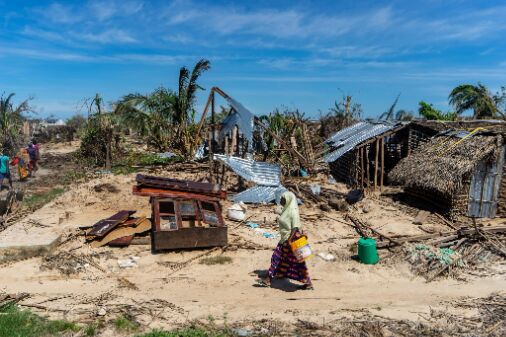Act on commitments
Although Glasgow pact appears weak on promises, developing nations have managed to bring adaptation in focus and bargained financial commitments from developed world

The 26th Conference of Parties (CoP26) on climate change under the chairmanship of Britain ended on November 13 in Glasgow and, as usual, offering very little to cheer at but attracting a lot of polemics in wake of the grim picture painted by the sixth report of Intergovernmental Panel on Climate Change (IPCC), published few months before the CoP26. The IPCC report warned that the world leaders had to work really hard with deep commitments to limit global temperature to 1.5 degrees Celsius. A large number of heads of States and governments attended CoP26 and pledged their views and commitment on implementation of the Paris Agreement arrived at during 2015. The British Prime Minister termed the meet as very successful and hoped it would signal a new trend in uniting the world to limit the rise in global temperature to 1.5 degree Celsius by the end of the century. Environmentalists have however criticised it saying that the key elements of climate change were side-lined, and rather ignored. The developed world, as usual, harped on stopping the use of coal and subsidies on fossil fuels — ignoring the ground realities of the developing world that is faced with challenges of meeting energy needs for developmental works and reduction of poverty. The countries in the developing world also face the challenge of combating the adverse effects of climate change. A large number of people would suffer if these impractical selfish ideas were accepted. Thanks to the efforts of India and other developing nations, the final agreement toned down the words and pledged to reduce the use of coal and fossil fuel.
As per the Paris agreement, the developed world was supposed to provide USD 100 billion annually by the year 2020 to the developing countries to help them meet their adaptation and mitigation targets. The new technologies and innovative attempts require finances, and unless it is done it will be a pipedream to achieve the targets. The Glasgow declaration is weak on promises, especially on reparation for loss and damages, though the developed countries have now agreed to provide USD 100 billion by 2023. In reality, after 2025, if the net-zero emission targets are to be achieved by 2050 to 2070, at least USD 500 billion would be needed annually. Furthermore, because of the intransigence of the developed world, the scope for opening up adequate space for carbon trade remains an issue. In a nutshell, the developed world has failed to acknowledge its historical responsibility for emissions and, on the contrary, at each CoP, they have been pressurising the developing world to opt for impractical conditions. Thus, the questions of equity and differential responsibility always get side-lined in these negotiations.
From the Indian side, some positive declarations were made by the Prime Minister, aimed at achieving net-zero emissions by 2070. He announced the 'Panchamrit' concept in his National Statement. The PM said the first agenda was to raise the non-fossil fuel-based energy capacity of the country to 500 GW by 2030.
Also, by 2030, 50 per cent of the country's energy requirements would be met using renewable energy sources. The country will reduce the total projected carbon emissions by one billion tonnes by 2030. Carbon intensity of the economy would be reduced to less than 45 per cent by 2030 and the ultimate agenda, he said, would be to make the country carbon neutral and achieve net zero emissions by 2070. India has set a big target as it is on the course to achieving its promised commitments at the Paris agreement.
Let us see what the Glasgow pact said about the achievements of Cop26. On mitigation, it asked the participating countries to prop up their climate action plan for 2030 by the next year and also proposed to hold ministers' meetings to raise the ambitions (as it says!) of a climate action plan for 2030. It also urged the countries to make efforts towards reducing the usage of coal, and abolishing "inefficient" subsidies on fossil fuels. It called for a phase-down of coal, and phase-out of fossil fuels. This is the first time that coal has been explicitly mentioned in any CoP decision. It also led to big fracas at the end, with a group of countries led by India and China forcing an amendment to the term "phase-out" in relation to coal to change it to "phase-down". On adaptation, it asked the developed countries to at least double the money being provided for adaptation by 2025 from the 2019 levels. The Paris agreement had been good for mitigation goals but was silent on adaptation. The global goal on adaptation has been missing to date, primarily because of the difficulties in defining such a target. Unlike mitigation efforts that bring global benefits, the benefits from adaptation are local or regional. On the insistence of developing countries, this declaration has proposed a two-year programme to define a global goal on adaptation. For loss and damages, it has been agreed to establish a dialogue on the insistence of developing countries. The carbon market vanished after the end of the Kyoto Protocol. The Glasgow Pact has offered some reprieve to the developing nations. It has allowed these carbon credits to be used in meeting countries' first Nationally Determined Contributions till 2025.
The Climate Change targets can only be met if the developed world accepts the reality and stops dilly-dallying. The Prime Minister of India as well as the Environment Minister need to take several innovative actions to achieve the targets of net-zero emission by 2070. At the country level we need to integrate and converge the development process with ecological sustainability; a lot needs to be done beyond the energy sector.
The writer is Chairman of the Centre for Resource Management and Environment. Views expressed are personal.



